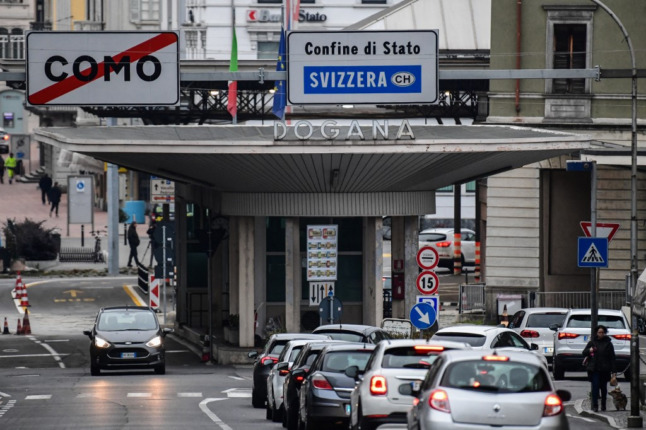Despite a recent reform effort, taxpayers who reside abroad and earn income in Switzerland will be able to continue to claim social deductions both in Switzerland and in their home countries.
Current Swiss law obliges cantons to take into account a deduction for family expenses when calculating withholding tax for non-residents.
In June 2021, conservative Ticino MP Marco Chiesa (SVP) presented a motion to the Council of States, the lower house of the parliament, to end this practice.
Chiesa argued that tax deductions for children, or young people who are in apprenticeship or at university, are already granted in the taxpayer’s home country.
However, on Wednesday, the majority of deputies rejected this proposal.
This means the current system of taxation imposed on non-resident foreigners who are employed in Switzerland, including an estimated 340,000 cross-border workers, will remain unchanged for the time being.
READ MORE: Reader question: Can I deduct working-from-home costs from my Swiss taxes?
What are the tax rules for cross-border employees in Switzerland?
An agreement between Switzerland and France, Italy, and Germany authorises cantons to subtract withholding tax (also known as taxation at source) from cross-border workers’ wages.
This system is different from the one used by resident workers, who declare their income and pay taxes in monthly instalments throughout the year.
The taxes that cross-border workers pay in Switzerland are deducted from their tax liability in their country of residence.
To determine the withholding tax rate, the total gross income from all employment, including supplementary earnings such as benefits from invalidity or accident insurance, are calculated.
Employers then forward the levied amounts to cantonal tax authorities.
This tax system applies only to G-permit border workers and foreigners who are not permanent residents.
This is how it works by country of residence:
Italy
The tax agreement signed between Bern and Rome in December 2020 distinguishes between “new” and “old” cross-border commuters. For those who start working in Switzerland after the agreement enters into force, the withholding tax rate will be 80 percent in favour of Switzerland, instead of the 70 currently.
France
Under the taxation regime currently in place, permit G holders who work in cantons other than Geneva have their taxes collected by French authorities.
But if their place of employment is Geneva, taxes are paid in Switzerland.
Germany
Since 2019, a ‘day-count’ method is used to determine taxation of border workers.
This relates to 60 ‘non-return days’, defined as a day when the workers can’t return to Germany due to professional duties in Switzerland.
If the 60-day limit is not exceeded, the workers pay taxes in Germany. If it is, employees are subject to the Swiss withholding taxes system.
What about changes to the system?
Some tax changes were introduced in 2021.
Switzerland’s new law on taxation at source is intended to ensure compliance with rules stipulated in the EU/EFTA agreement on the free movement of persons.
Most specifically, its aim is to eliminate disparities in treatment between workers subjected to withholding tax and those under the ordinary taxation regime.
Also, the cantons will be required to standardise the calculation of withholding taxes throughout Switzerland.
Do all of the collected taxes stay in Switzerland?
While most of this money does remain in Switzerland, a portion is paid to the employees’ respective countries of residence or regional authorities there.
This is how much tax Switzerland pays to workers’ home countries:
In 2022, Geneva paid 343 million francs from 2020 taxes to the French departments from where some 87,000 workers commute to their jobs in the canton each day.
Under the deal worked out in 1973, 3.5 percent of the tax collected from cross-border workers goes to France, with 76 percent of that total transferred to Haute-Savoie and the rest to Ain — the two regions from which most workers commute to Geneva.
This sum is intended to compensate for the public charges incurred by cross-border workers in their French municipalities. The funds are supposed to be used for infrastructure projects of regional importance, in particular those managing mobility on both sides of the border.
Also in 2020, Ticino authorities had paid of nearly 90 million francs to Italy, collected from approximately 67,000 frontier workers employed in the canton.
Will the failure of negotiations between Switzerland and the European Union impact taxation of border workers?
The full extent of repercussions is not yet known, including on taxes.
However, in a broader sense there is concern in the border cantons that Switzerland’s decision to abandon the bilateral talks will influence their ability to employ G-permit frontier workers.
“Breaking off the negotiations is really problematic for us”, Serge dal Busco, the vice-president Geneva’s government said in an interview with Swiss media.
READ MORE: What impact could the Swiss-EU stalemate have on cross-border workers?



 Please whitelist us to continue reading.
Please whitelist us to continue reading.
Member comments